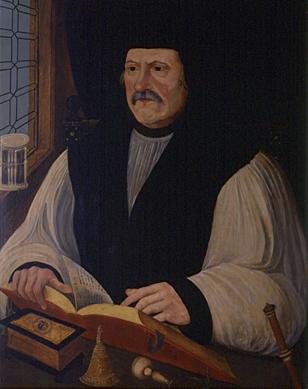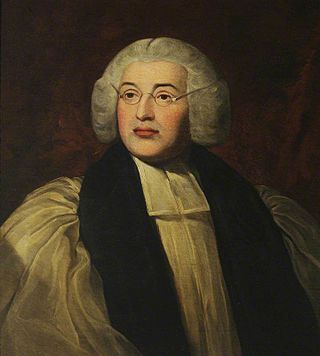
Richard William Pfaff (1936-10 July 2016) was an American historian specializing in medieval English liturgy.

Richard William Pfaff (1936-10 July 2016) was an American historian specializing in medieval English liturgy.
He was a descendant of German settlers in the Midwest. [1] In 1966, he was ordained a priest in the Episcopal Church. [1]
He completed his B.A. in history at Harvard College. [1] He later received the Rhodes scholarship and attended Magdalen College, Oxford, where he received his D.Phil in history. [1] He served as a professor of history at the University of North Carolina Chapel Hill until his retirement in 2006. [1]
In 1993, he became a Fellow of the Society of Antiquaries of London. [1]
He was married to Margaret Campbell until her death in 2010; they had one son. He married Jeanette Falk shortly before his death. [1]
His notable books include: [2] [3]

Matthew Parker was an English bishop. He was the Archbishop of Canterbury in the Church of England from 1559 to his death. He was also an influential theologian and arguably the co-founder of a distinctive tradition of Anglican theological thought.

The Oxford Movement was a movement of high church members of the Church of England which began in the 1830s and eventually developed into Anglo-Catholicism. The movement, whose original devotees were mostly associated with the University of Oxford, argued for the reinstatement of some older Christian traditions of faith and their inclusion into Anglican liturgy and theology. They thought of Anglicanism as one of three branches of the "one, holy, catholic, and apostolic" Christian church. Many key participants subsequently converted to Roman Catholicism.
The Paston Letters is a collection of correspondence between members of the Paston family of Norfolk gentry and others connected with them in England between the years 1422 and 1509. The collection also includes state papers and other important documents.

All Saints is an Anglo-Catholic church on Margaret Street in London, England. Founded in the late 18th century as Margaret Street Chapel, the church became an example of the Oxford Movement in the 1830s and 40s. The Movement also prompted the reconstruction of the church in the 1850s under the architect William Butterfield, and the establishment of the Society of All Saints Sisters of the Poor, affiliated to the church.

George Horne was an English churchman, academic, writer, and university administrator.

The Use of Sarum is the liturgical use of the Latin rites developed at Salisbury Cathedral and used from the late eleventh century until the English Reformation. It is largely identical to the Roman Rite, with about ten per cent of its material drawn from other sources. The cathedral's liturgy was widely respected during the late Middle Ages, and churches throughout the British Isles and parts of northwestern Europe adapted its customs for celebrations of the Eucharist and canonical hours. The Sarum Rite has a unique ecumenical position in influencing and being authorized for liturgical use by the Roman Catholic Church, Eastern Orthodox Church, as well as the Anglican Communion.

A customary is a Christian liturgical book containing the adaptation of a ritual family and rite for a particular context, typically to local ecclesiastical customs and specific church buildings. A customary is generally synonymous to and sometimes constituent of a consuetudinary that contains the totality of the consuetudines—ceremonial forms and regulations—used in the services and community practices of a particular monastery, religious order, or cathedrals. The distinctive qualities of medieval liturgical uses are often described within customaries. In modern contexts, a customary may also be referred to as a custom book.

Percival Dearmer was an English Anglican priest and liturgist best known as the author of The Parson's Handbook, a liturgical manual for Anglican clergy, and as editor of The English Hymnal. A lifelong socialist, he was an early advocate of the public ministry of women and concerned with social justice. Dearmer, with Ralph Vaughan Williams and Martin Shaw, helped revive and spread traditional and medieval English musical forms. His ideas on patterns of worship have been linked to the Arts and Crafts Movement, while The English Hymnal reflects both folkloric scholarship and Christian Socialism. At his death, he was a canon of Westminster Abbey, where he ran a canteen for the unemployed.
Paul Frederick Bradshaw, FRHistS is a British Anglican priest, theologian, historian of liturgy, and academic. In addition to parish ministry, he taught at Chichester Theological College and Ripon College Cuddesdon. From 1985 to 2013, he was Professor of Liturgy at the University of Notre Dame in the United States.
Richard Barrie Dobson, was an English historian who was a leading authority on the legend of Robin Hood as well as a scholar of ecclesiastical and Jewish history. He served as Professor of Medieval History at the University of Cambridge from 1988 to 1999.
Margaret Evelyn Buxton, known by her first married name Margaret Aston, was a British historian and academic specialising in the Late Medieval Period and ecclesiastical history. During her career, she lectured at both the University of Oxford and the University of Cambridge.
James Campbell, was a British historian, specialising in the medieval period and the Anglo-Saxons. He was a Fellow of Worcester College, Oxford, from 1957 until his retirement in 2002, and Professor of Medieval History at the University of Oxford from 1996 to 2002.
Edward Craddock Ratcliff was an English Anglican priest and liturgical scholar. He was Professor of Liturgical Theology at King's College, London (1945–1947), and Ely Professor of Divinity (1947–1958) and Regius Professor of Divinity (1958–1964) at the University of Cambridge.
Susan Kathleen Rankin, FBA, FSA, is an English musicologist. Since 2006, she has been a professor of medieval music at the University of Cambridge; she has also been a Fellow of Emmanuel College, Cambridge, since 1981.
Margaret Templeton Gibson was a British historian and academic, who specialised in early medieval history, biblical exegesis, and medieval philosophy. Having studied at the University of St Andrews and the University of Oxford, she then spent her entire teaching career at the University of Liverpool (1966–1991): at the height of her career, she was Reader in Medieval History and Director of the Liverpool Centre for Medieval Studies. In retirement and through illness, she was a senior research fellow at St Peter's College, Oxford until her death in 1994 from cancer.
Alexander Hamilton Thompson, was a historian. He was Professor of Medieval History at the University of Leeds from 1924 to 1939.

The Edwardine Ordinals are two ordinals primarily written by Thomas Cranmer as influenced by Martin Bucer and first published under Edward VI, the first in 1550 and the second in 1552, for the Church of England. Both liturgical books were intended to replace the ordination liturgies contained within medieval pontificals in use before the English Reformation.
Francis Procter was an English Anglican clergyman and liturgist known for his history of the Book of Common Prayer, the official liturgical book of the Church of England. His A History of the Book of Common Prayer, with a Rationale of its Offices was first published in 1855. A revision of this book first released in 1901 by Walter Frere–known as "Procter and Frere"–became a leading academic history of Anglican liturgy. Procter also produced other works, including an edition of the Sarum breviary first published in 1875. During his career, Procter was a fellow at St Catharine's College, Cambridge, and a minister at several English parishes.
A History of the Book of Common Prayer, with a Rationale of its Offices is an 1855 textbook by Francis Procter on the Book of Common Prayer, a series of liturgical books used by the Church of England and other Anglicans in worship. In 1901, Walter Frere published an updated version, entitled A New History of the Book of Common Prayer. Known commonly as Procter and Frere, the book remained a major text in the liturgiological study of the Book of Common Prayer through much of the 20th century. Later works, such as Geoffrey Cuming's 1969 A History of Anglican Liturgy, were written to supersede Procter and Frere as comprehensive studies following the release of further Anglican liturgical texts.
Margaret Deanesly was an English historian who wrote on church history.